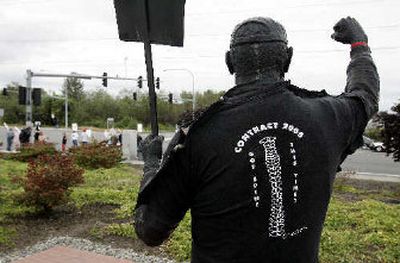Boeing strike has roots in the past

EVERETT — Of all the numbers that Boeing Machinists said they were unhappy with when they went on strike Friday, one sticks out: 2002.
That’s the year Machinists — sobered by the effects on the airline industry of the Sept. 11. 2001, terror attacks — negotiated what they now consider a sub-par contract.
This year, with airplane orders piling up again, they want those perceived wrongs rectified.
“We’ve been through some real hardships,” Mark Blondin, president of Machinists District Lodge 751, told workers after the strike vote. “We were hurt by 9/11, but we were also hurt by a company that used 9/11 to take advantage of us.”
About 18,400 Machinists who assemble Boeing’s commercial airplanes and some key components walked off the job Friday, forcing the Chicago-based company to immediately stop making airplanes. Machinists in the Puget Sound area, Gresham, Ore., and Wichita, Kan., voted overwhelmingly late Thursday to strike, rejecting a three-year contract proposal their leaders called “insulting.”
It wasn’t clear when the two sides might resume negotiations. Boeing spokesman Charles Bickers said Friday the company was open to discussion, but “we want to make sure both sides understand the business realities we face.”
Union spokeswoman Connie Kelliher said it was up to Boeing to reopen talks.
Shares of the company fell $1.49, or 2.3 percent, to close at $64.50 in trading Friday on the New York Stock Exchange. Boeing shares have traded in a 52-week range of $48.10 to $68.38.
Boeing has said a walkout would be devastating and could cause customers to jump to competitors including European archrival Airbus SAS.
Aviation analyst Scott Hamilton said a strike of two months or so would probably be more of an inconvenience than anything, but longer than that could cause Boeing to lose some orders.
He said the fact that a “stunning” 86 percent of union workers voted to strike will likely give members the confidence to dig their heels in — and force Boeing to rethink its strategy at the bargaining table.
“This just sends, I think, a heck of a message to the company, that their proposal wasn’t just a little off base. It was way off base,” Hamilton said.
On picket lines Friday around Boeing’s massive plants, some longtime workers said they had been hesitant to walk off their jobs in 2002 after thousands of their colleagues were laid off, and the airline industry was in a downturn.
But Boeing’s fortunes have improved since the contract that was approved three years ago. The company is enjoying a strong rebound in commercial airplane orders and is striving to beat Airbus SAS on new commercial jet orders for the first time since 2000.
Boeing had racked up 529 orders through the end of July, compared with 299 orders for Airbus.
Airbus is ahead on deliveries so far, with 216 planes as of the end of July, compared with 179 for Boeing. Boeing expects to deliver 320 airplanes this year, and Airbus expects to deliver 360.
Boeing’s financial picture has also improved, leaving many of the striking workers to say that while they were willing to make concessions in 2002, they’re not willing to do so now.
Before the strike vote, Steven Morrison, who has worked for Boeing for nearly nine years, and another Machinist had shirts printed up that read: “Contract 2005: Got Spine This Time?”
Many union members also said they felt the company proposal this year was worse than the pact negotiated in 2002, especially in terms of pension payouts and health care.
“It’s one thing to bring us a bad contract during an industry downturn, but it’s something else to bring us a bad contract when things are looking up,” said Paul Veltkamp, a nine-year employee picketing 30 miles north of Seattle at the Everett plant, where 747s are built.
Bickers said Friday that while the company was facing a steeper downturn in 2002, it continues to have fierce competition and other financial pressures.
He defended the company’s offer as fair and competitive, and said the retirement package is at the leading edge of the industry. The offer included a new and lucrative incentive-pay deal, he said.